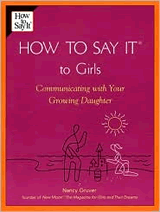
Peer
Pressure
Excerpt
from How to Say It To Girls: Communicating
with Your Growing Daughter
by
Nancy Gruver, founder,
New Moon Publishing
< back
to Parenting main page
 “I’m
worried that Liz is hanging out with a group
that’s kind of ‘fast’ about
drinking and sex. I don’t think she really
wants to do these things, but these kids are
in the neighborhood and have been her friends
since fifth grade. I’m not sure she can
resist the peer pressure to do some things she
wouldn’t do otherwise. Should I just tell
her she can’t go out with them anymore?”-Bernie “I’m
worried that Liz is hanging out with a group
that’s kind of ‘fast’ about
drinking and sex. I don’t think she really
wants to do these things, but these kids are
in the neighborhood and have been her friends
since fifth grade. I’m not sure she can
resist the peer pressure to do some things she
wouldn’t do otherwise. Should I just tell
her she can’t go out with them anymore?”-Bernie
Things to Consider
Peer
pressure can definitely encourage your daughter
to do things she wouldn’t do otherwise—both
negative and positive. It does matter
who her friends are and what their values, activities,
and ambitions are. Most people tend to act like
the people they spend a lot of time with. If
you’re concerned about what her friends
are interested in, it’s important to talk
with your daughter about that in a calm, open,
nonaccusatory way.
What doesn’t help
is making snap judgments or basing your opinion
of her friends on how they dress or their family’s status. Those things are superficial, and your
criticism might make her feel she has to defend them, even when she doesn’t
agree with them. But if you know or suspect that her friends are doing dangerous
or illegal things, you’re wise to put firm limits on when and show she
spends time with those friends (mainly with adult supervision). She’s
still maturing, and her good judgment may be diluted by wanting to fit in with
her peers. Don’t blame her for that feeling, but guide her away from
the unhealthy behaviors.
What to Say and Do
8-13 YEARS OLD
If she starts to find different values and goals
between her and her friends, just listen and
ask gentle questions when she talks about it.
- It sounds like things are changing between
you and Julie. That sounds difficult.
- You sound worried about Becka’s new
friends. You still want to be loyal to Becka,
but you don’t like some of the things
she does with that other crowd.
- How do you feel about it?
If she starts showing behavior
that concerns you, talk with her about her
behavior/responsibility, and don’t blame
it on her friends.
Create adult-supervised situations for her to
be with peers you may be concerned about
14 AND UP
If you’re concerned about how her friends
act, convey your concern for them and their well-being.
- It seems like Tricia has really
changed a lot in the past few months. I get
the feeling she might be having sex. I’m
concerned about protecting herself with birth
control and STD prevention.
- In tenth grade my oldest friend
started drinking a lot and we grew apart.
I was really confused and didn’t know
what to do. Now I realize I might have helped
her by talking with a professional about
it
Words and Phrases to Use
- Behavior
- Your values
- Choices
- Options
- Caring
- Concern
- Safety
- Loyalty
- Good friend
- How do you feel when they do that?
Words Not to Say and Do
Don’t try to turn her against her friends.
Don’t say,
- Those kids are losers. Why do you hang out
with them?
- You have to choose between them and us.
Don’t fault her for being affected by
peer pressure. Don’t say,
- You’re just weak and can’t
say no to them.
- You have no guts
- Don’t you have a mind
of your own?
Words and Phrases to Avoid
- Forbid
- Never
- Bad news
- No future
- Jailbait
- No contact at all
Excerpt
from How to Say It To Girls: Communicating
with Your Growing Daughter by Nancy Gruver, founder, New Moon Publishing
About New Moon Girl Media
Since 1992, New Moon has given girls ages 8-12 a place to create their own media and share it with the world. A champion of girl-centered content with New Moon Girls magazine and the groundbreaking online community www.newmoon.com, NM pioneers innovative, ad-free communities where girls develop their full potential in safe, creative and positive worlds. NM is the expert in original, high-quality content made by girls and selected by their peers. Learn more at www.newmoon.com
|
